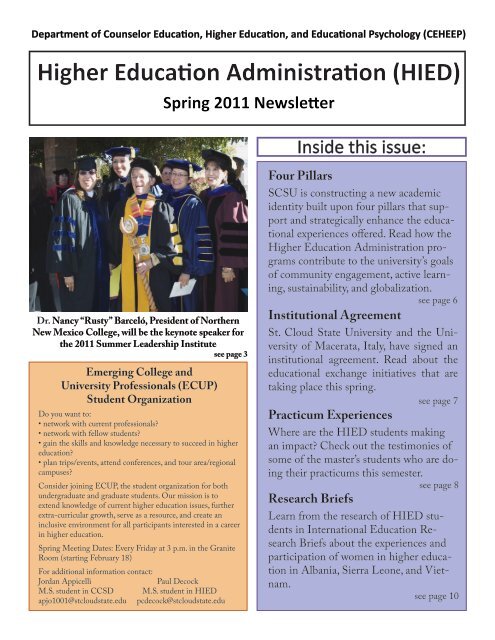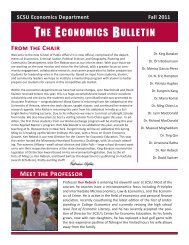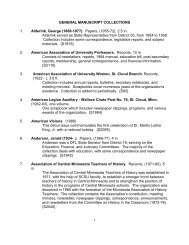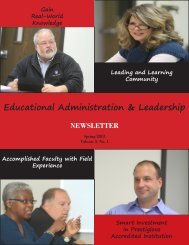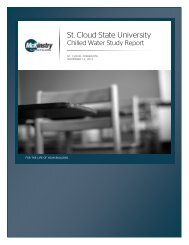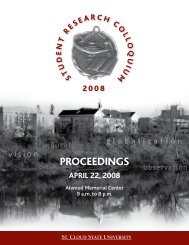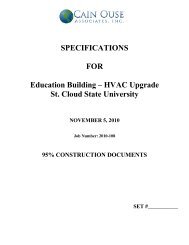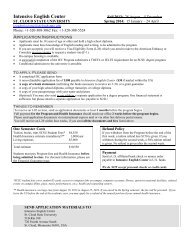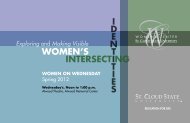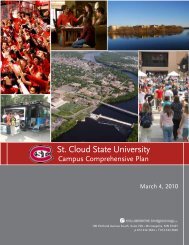Inside this issue: - St. Cloud State University
Inside this issue: - St. Cloud State University
Inside this issue: - St. Cloud State University
Create successful ePaper yourself
Turn your PDF publications into a flip-book with our unique Google optimized e-Paper software.
Department of Counselor Education, Higher Education, and Educational Psychology (CEHEEP)<br />
Spring 2011 Newsletter<br />
<strong>Inside</strong> <strong>this</strong> <strong>issue</strong>:<br />
Dr. Nancy “Rusty” Barceló, President of Northern<br />
New Mexico College, will be the keynote speaker for<br />
the 2011 Summer Leadership Institute<br />
see page 3<br />
Emerging College and<br />
<strong>University</strong> Professionals (ECUP)<br />
<strong>St</strong>udent Organization<br />
Do you want to:<br />
• network with current professionals?<br />
• network with fellow students?<br />
• gain the skills and knowledge necessary to succeed in higher<br />
education?<br />
• plan trips/events, attend conferences, and tour area/regional<br />
campuses?<br />
Consider joining ECUP, the student organization for both<br />
undergraduate and graduate students. Our mission is to<br />
extend knowledge of current higher education <strong>issue</strong>s, further<br />
extra-curricular growth, serve as a resource, and create an<br />
inclusive environment for all participants interested in a career<br />
in higher education.<br />
Spring Meeting Dates: Every Friday at 3 p.m. in the Granite<br />
Room (starting February 18)<br />
For additional information contact:<br />
Jordan Appicelli<br />
Paul Decock<br />
M.S. student in CCSD M.S. student in HIED<br />
apjo1001@stcloudstate.edu pcdecock@stcloudstate.edu<br />
Four Pillars<br />
SCSU is constructing a new academic<br />
identity built upon four pillars that support<br />
and strategically enhance the educational<br />
experiences offered. Read how the<br />
Higher Education Administration programs<br />
contribute to the university’s goals<br />
of community engagement, active learning,<br />
sustainability, and globalization.<br />
see page 6<br />
Institutional Agreement<br />
<strong>St</strong>. <strong>Cloud</strong> <strong>St</strong>ate <strong>University</strong> and the <strong>University</strong><br />
of Macerata, Italy, have signed an<br />
institutional agreement. Read about the<br />
educational exchange initiatives that are<br />
taking place <strong>this</strong> spring.<br />
see page 7<br />
Practicum Experiences<br />
Where are the HIED students making<br />
an impact? Check out the testimonies of<br />
some of the master’s students who are doing<br />
their practicums <strong>this</strong> semester.<br />
see page 8<br />
Research Briefs<br />
Learn from the research of HIED students<br />
in International Education Research<br />
Briefs about the experiences and<br />
participation of women in higher education<br />
in Albania, Sierra Leone, and Vietnam.<br />
see page 10
Higher Education Administration Newsletter Page 2<br />
Editors<br />
Dr. Gabriela J. Silvestre<br />
Assistant Professor of HIED<br />
Alvaro J. Marmolejo Davis<br />
Ed.D. <strong>St</strong>udent and HIED G.A.<br />
SCSU Reorganization<br />
For over a year, the faculty and staff of SCSU have been<br />
engaged in program review and administrative consolidation.<br />
While these activities continue, some decisions<br />
have been made and the impact on the higher education<br />
administration programs is becoming clearer.<br />
The College of Education will be renamed the School<br />
of Education. The current home department of the<br />
higher education programs, the CEHEEP Department,<br />
will be re-structured and the counseling programs that<br />
were part of that department will become part of the<br />
new School of Health and Human Services. The higher<br />
education programs will join with the K-12 administration<br />
programs in a new department within the School of<br />
Education.<br />
The name of the new department has not been determined<br />
yet. We will let you know the new department’s<br />
name. All these changes are at the administrative level,<br />
but the doctoral and masters programs are operating<br />
much as they have in the past, so we hope that the student<br />
experience will be largely unaffected.<br />
Ed.D. Director<br />
Dr. Michael R. Mills<br />
With the start of the new, spring term Michael Mills<br />
has reassumed the Program Director duties for the doctoral<br />
program. The change is to insure that the faculty<br />
member with the most time to devote to the program<br />
takes on the coordinator role. Christine Imbra deserves<br />
the appreciation of all of us for the job she has done as<br />
coordinator during <strong>this</strong> past fall term.<br />
Dr. Michael R. Mills<br />
Table of Contents<br />
Summer Leadership<br />
Institute..............................Page 3<br />
HIED Updates.................... Page 4<br />
Faculty Updates...................Page 5<br />
Education Abroad<br />
Scholarships.......................Page 5<br />
Announcements.................. Page 5<br />
Upcoming Conferences<br />
Conference Proposals Meeting<br />
CEHEEP Spring Showcase<br />
Practicum Poster Session Meeting<br />
HIED Facebook Page<br />
HIED’s Contributions<br />
to SCSU’s Four Pillars..........Page 6<br />
<strong>St</strong>. <strong>Cloud</strong> <strong>St</strong>ate <strong>University</strong><br />
and <strong>University</strong> of Macerata<br />
Agreement...........................Page 7<br />
Prof.ssa Paola Nicolini Visits SCSU<br />
Education Abroad Trip to Italy<br />
Higher Education<br />
Practicum Experiences.........Page 8<br />
Thesis..................................Page 9<br />
Research Briefs...................Page 10<br />
Scholarly Events.................Page 12
Higher Education Administration Newsletter Page 3<br />
Summer Leadership Institute (SLI)<br />
SLI Schedule<br />
8:30 - 9:00 a.m. Registration<br />
Continental Breaksfast<br />
Attendees listening to Dr. Pamela Eddy’s keynote during the 2010<br />
Summer Leadership Institute. Dr. Eddy is an Associate Professor of<br />
Higher Education at The College of William and Mary.<br />
Save the date!<br />
Third Annual<br />
Summer Leadership Institute<br />
for Women in Higher Education<br />
“Female Leaders Embracing<br />
Diversity in Higher Education”<br />
June 22, 2011<br />
8:30 a.m. - 4:30 p.m.<br />
<strong>St</strong>. <strong>Cloud</strong> <strong>St</strong>ate <strong>University</strong><br />
More information coming soon:<br />
http://www.stcloudstate.edu/hied/summerinstitute.asp<br />
9:00-10:15 a.m. Opening Welcome<br />
Keynote Address<br />
10:30-11:45 a.m. Break Out Sessions<br />
- The <strong>St</strong>atus of Diversity in Higher Education<br />
- Internationalization of Higher Education<br />
12:00-12:30 p.m. Lunch<br />
12:30-1:15 p.m. Speed Networking<br />
1:30-2:45 p.m. Breakout Sessions:<br />
- Social Justice on Campus<br />
- Creating a Supportive and Welcoming<br />
Campus Environment for Under-represented<br />
Women<br />
3:00-4:30 p.m. Dessert Reception<br />
Panel:<br />
- Generational Diversity Amongst Female<br />
Administrators<br />
Keynote Speaker<br />
Nancy “Rusty” Barceló<br />
President, Northern New Mexico College<br />
Dr. Barceló is a pioneer for multiculturalism with over 30 years of experience<br />
in higher education. Prior to the presidency, Dr. Barceló held<br />
several executive positions in higher education, including Vice President<br />
and Vice Provost for Equity and Diversity at the <strong>University</strong> of<br />
Minnesota and Vice President for Minority Affairs and Diversity at<br />
the <strong>University</strong> of Washington.<br />
Dr. Barceló is credited as the moving force behind the National Initiative<br />
for Women in Higher Education (NIWHE). In 2004, she received<br />
the Ohtli award, a special recognition presented by the Mexican government<br />
to Mexicans or Latinos whose work has benefited Mexicans<br />
living abroad.<br />
Dr. Barceló holds a B.A. in Social Work from Chico <strong>St</strong>ate <strong>University</strong>,<br />
a M.A. in Recreational Education from the <strong>University</strong> of Iowa, and<br />
a Ph.D. in Higher Education Administration from the <strong>University</strong> of<br />
Iowa, from which she was the first Mexican-American to earn a doctoral<br />
degree.
Higher Education Administration Newsletter Page 4<br />
HIED Updates<br />
Jill Andel- M.S. <strong>St</strong>udent<br />
Jill attended the American Association of Collegiate Registrars<br />
and Admissions Officers (AACRAO) Transfer Conference,<br />
held January 30-February 1, in New Orleans, LA,<br />
to learn about Transfer Recruitment Trends. Great commitment,<br />
Jill!<br />
Eglantina Cenolli - M.S. <strong>St</strong>udent<br />
Eglantina presented on the panel “Women in Higher Education<br />
From a Global Perspective”, held on November 15, 2010<br />
during International Education Week at the College of Education.<br />
Her presentation focused on women in higher education<br />
in Albania. Great job, Eglantina!<br />
Paul DeCock - M.S. <strong>St</strong>udent<br />
Paul was promoted to Interim Hall Director of W.W. Holes<br />
Hall, at <strong>St</strong>. <strong>Cloud</strong> <strong>St</strong>ate <strong>University</strong>. Congrats, Paul!<br />
Kevin Hammond - M.S. <strong>St</strong>udent<br />
Kevin accepted a graduate assistantship in the MBA office at<br />
the Herberger College of Business, SCSU. Kevin will work<br />
on projects related to communication, recruiting, operating<br />
procedures, and MBA advising practices. Congrats, Kevin!<br />
Karen Kedrowski - M.S. Alumna<br />
Karen will join the Northeast Higher Education District as<br />
vice president of finance and administration, effective March<br />
2. She will be responsible for district-level long-range financial<br />
and facilities planning, providing research and data analysis<br />
of revenue/expense patterns, and implementation of a<br />
shared services model that facilitates the sharing of resources<br />
among the five colleges of the District. Fantastic work, Karen!<br />
Katya Leek - M.S. Alumna<br />
Katya accepted a post-graduate internship position at the International<br />
Programs Office at the <strong>University</strong> of Wisconsin<br />
<strong>St</strong>evens Point. The focus of the internship is strategic planning<br />
in international education. Congratulations, Katya!<br />
Patricia McAuley - Ed.D. <strong>St</strong>udent<br />
Patricia recently accepted a position at South Central College<br />
in North Mankato, Minnesota as Financial Aid Outreach<br />
Coordinator. She has also completed her dissertation<br />
research and is preparing to defend Spring Semester. The title<br />
of her dissertation is “Effect of Institutional Image and Person-Environment<br />
Fit on College Choice.” Great work, Pat!<br />
Julia McBride-Bibby - M.S. <strong>St</strong>udent<br />
Julia recently accepted a position as an Outreach Coordinator<br />
for Hennepin Technical College, Brooklyn Park Campus.<br />
She will be providing outreach within the greater Minneapolis/<strong>St</strong>.<br />
Paul communities. Congratulations, Julia!<br />
Kimberly Roan - Ed.D. <strong>St</strong>udent<br />
Kimberly was selected to participate in the Anoka Technical<br />
College and Anoka Ramsey Community College President<br />
Search. She will also be presenting “Don’t get Zapped by<br />
SAP, Practical Ways of Minimizing Probation and avoiding<br />
Suspension” at Anoka Technical College <strong>St</strong>udent Success<br />
Day on March 8, 2011. Congrats, Kimberly!<br />
Evan Schaefer - M.S. Alumnus<br />
Evan was selected to serve a two year term as the Block<br />
Booking Coordinator for the West Region of NACA. He<br />
will be responsible for facilitating the process of helping<br />
schools find deals and price breaks when booking talent to<br />
perform at their respective institutions. Evan was also selected<br />
to mentor a new staff member for the Programming<br />
and Activites Board (PAB) at Arizona <strong>St</strong>ate <strong>University</strong>.<br />
Bravo, Evan!<br />
Holly Schuck - M.S. <strong>St</strong>udent<br />
In November 2010, Holly Schuck co-organized the first<br />
PSEO Coordinator Conference for MnSCU officials, bringing<br />
together PSEO program staff from two and four year<br />
campuses throughout the system. Attendees worked towards<br />
creating best practices within the field and increased networking<br />
opportunities. This will now become a yearly activity<br />
based on the success of the first program. Well done, Holly!<br />
Patrick Smith - M.S. <strong>St</strong>udent<br />
Patrick recently accepted a position as a Work Based Learning<br />
Coordinator with Minneapolis Community and Technical<br />
College. Congratulations, Patrick!<br />
Gina Sobania - M.S. Alumna<br />
Gina was promoted to Military Education Director at the<br />
MnSCU Office of the Chancellor. Congratulations Gina!<br />
Mary Tosch - Ed.D. <strong>St</strong>udent<br />
Mary served on the NASPA IV-East Conference Committee<br />
as the Publications Chair for the conference held last<br />
year in Minneapolis. In January, Mary was selected to attend<br />
the NASPA Aspiring SSAO Institute in Ft. Lauderdale,<br />
FL. Excellent work, Mary!<br />
Tracey Wyman - Ed.D. <strong>St</strong>udent<br />
Tracy presented at the <strong>St</strong>udent Affairs and Diversity and<br />
Multiculturalism Conference, held February 24-25, 2011 in<br />
Minneapolis. The title of her presentation was “Diversity<br />
Training That Really Works.” Great job, Tracey!<br />
Ryan Yunkers - Ed.D. <strong>St</strong>udent<br />
The student leadership program that Ryan developed in partnership<br />
with the Honors program and the Mankato Chamber<br />
of Commerce titled “Leaders of Tomorrow” was selected<br />
for the 2011 Silver Honoree award as an innovative program<br />
in the <strong>St</strong>udent Union, <strong>St</strong>udent Activities, Greek Life, Leadership,<br />
and Related category of the NASPA Awards. In addition,<br />
<strong>this</strong> program will be recognized through the NASPA<br />
Forum and showcased on the NASPA Excellence Awards<br />
web resource center. Fantastic work, Ryan!
Higher Education Administration Newsletter Page 5<br />
Dr. Gabriela J. Silvestre<br />
- Dr. Silvestre will be the discussant of two paper<br />
sessions entitled, “Faculty Issues and Practices in<br />
Postsecondary Education” and “International Approaches<br />
to Higher Education Policy and Finance” at<br />
the AERA 2011 Annual Meeting, held April 8-12,<br />
2011, in New Orleans, LA.<br />
- Xingcai Liu and Dr. Silvestre will present the paper<br />
“The Internationalization of the MnSCU Universities:<br />
The Perspective of International <strong>St</strong>udent Mobility”, at<br />
the CIES Conference, held May 1-4, 2011, in<br />
Montréal, Canada.<br />
- Dr. Silvestre and her colleague Dr. Judith Touré<br />
will be presenting a paper entitled “The Enactment<br />
of Whiteness in Higher Education” at the AAUP<br />
Conference on the <strong>St</strong>ate of Higher Education, held<br />
June 8-12, 2011, in Washington D.C.<br />
Upcoming conferences<br />
ACE Annual Meeting<br />
March 5-8, 2011<br />
Washington, D.C.<br />
http://www.aceannualmeeting.org/<br />
NASPA Annual Conference<br />
March 12-16, 2011<br />
Philadelphia, PA<br />
http://www.naspa.org/conf/<br />
ACPA Annual Conference<br />
March 26-30, 2011<br />
Baltimore, MD<br />
http://convention.myacpa.org/<br />
NACA Northern Plains Regional Conference<br />
March 31-April 3, 2001<br />
<strong>St</strong>. Paul, MN<br />
http://www.naca.org/nplportal.aspx<br />
AERA Annual Conference<br />
April 8-12, 2011<br />
New Orleans, LA<br />
http://www.aera.net/Default.aspx?id=10412<br />
Faculty Updates<br />
Dr. Michael R. Mills<br />
- Dr. Mills had his 2005 article “Experiences of academic unit reorganization: Organizational<br />
identity and identification in organizational change” (Review of Higher<br />
Education) reprinted in the 5th edition of the ASHE Reader on Organization and<br />
Governance in Higher Education, which came out late last year.<br />
- Dr. Mills is working on a new research project on communities of practice in higher<br />
education institutions.<br />
Dr. Christine M. Imbra<br />
- Dr. Imbra lead the presentation “Challenges of Women in Higher Education from<br />
a Global Perspective”, during January Workshops (2011), at SCSU.<br />
- Dr. Imbra will be co-presenting at the Conference “Honoring the Past, Connecting<br />
the Present, Shaping the Future: Women’s and Gender <strong>St</strong>udies”, held March 17-18,<br />
2011, at Inver Hills Community College, Inver Grove Hts., MN.<br />
- Dr. Imbra will direct the first Education Abroad experience to Italy, <strong>this</strong> summer<br />
2011.<br />
Education Abroad Scholarships<br />
Ten scholarships were awarded to students participating in the 2011 Italy Education Abroad trip <strong>this</strong> May by the HIED program. Scholarships<br />
are funded by proceeds from the annual Summer Leadership Institute for Women in Higher Education. Scholarship recipients will be honored<br />
at <strong>this</strong> year’s College of Education Dessert Fest in April and the Summer Leadership Institute in June:<br />
• Four Ed. D. students in Higher Education Administration each received a $1,000.00 scholarship - Lynn Conteh, Jodi Kuznia, Rita Miller, and<br />
Mary Tosch.<br />
• Five M.S. students in Higher Education Administration each received a $600.00 scholarship - Michele Braun, Melissa Huybrecht, Julia<br />
McBride-Bibby, Misty Pulcine, and Valerie Zahorski Schmidt.<br />
• One M.S. student from the <strong>University</strong> of Nevada Reno received a $300.00 scholarship - Chelsae Currie<br />
HIED faculty members are committed to awarding these scholarships each year, to assist our students in their quest to become global citizens.<br />
In addition, HIED students receiving these scholarships commit to volunteering at the annual Summer Leadership Institute.<br />
Announcements<br />
Conference Proposal Meeting<br />
Date: 03/04/2011<br />
Time: 2:00 p.m. to 4:00 p.m.<br />
Location: EB-A230<br />
Practicum Poster Session Meeting<br />
Date: 03/04/2011<br />
Time: 4:00 p.m. to 5:00 p.m.<br />
Location: EB-A122<br />
CEHEEP Spring Showcase<br />
Date: 04/15/2011<br />
Time: 5:00 p.m. - 8:00 p.m.<br />
Location: Radisson Hotel, <strong>St</strong>. <strong>Cloud</strong><br />
Join us on Facebook and<br />
support the HIED program:<br />
http://www.facebook.com/SCSUHIED
Higher Education Administration Newsletter Page 6<br />
HIED’s Contributions to SCSU’s Four Pillars<br />
This past year, reorganization has been the catalyst for change at <strong>St</strong>. <strong>Cloud</strong> <strong>St</strong>ate <strong>University</strong>. As the <strong>University</strong> sets its new course for<br />
the future, four pillars have been identified by the president as a way to achieve the mission and values of the <strong>University</strong> and prepare<br />
students for “work and life in the 21st century.” The four pillars represent strategic goals and set-up institutional priorities for the<br />
future of SCSU.<br />
The four pillars are:<br />
• Community Engagement – we must be what we teach in order to provide our students role models and real-life in action<br />
examples of what they are leaning in the classroom.<br />
• Active Learning – we must provide opportunities to put classroom learning into action in order to provide our students with<br />
practical experience and reinforcement of their learning.<br />
• Sustainability in its broadest sense – we must tend to our community as well as the physical environment so that our students<br />
can have real opportunities to succeed.<br />
• Globalization – we must be attentive to a changing world and agile in our adaptation to new developments in order to ensure<br />
that our students are prepared for a world in which nothing is static and knowledge rapidly becomes obsolete.<br />
Source: http://www.stcloudstate.edu/scsureorg/<br />
The Higher Education Administration (HIED) Program, in the context of the College of Education, is committed to enacting and<br />
contributing to enhance these four institutional pillars. The following are examples illustrating how faculty members and students in<br />
the program are promoting and contributing to the four pillars through a variety of curricular and co-curricular activities.
Higher Education Administration Newsletter Page 7<br />
<strong>St</strong>. <strong>Cloud</strong> <strong>St</strong>ate <strong>University</strong> and <strong>University</strong> of Macerata Agreement<br />
Prof.ssa Paola Nicolini Visits SCSU<br />
Prof.ssa Paola Nicolini, from the <strong>University</strong> of Macerata (UN-<br />
IMC), in Macerata, Italy, will be at <strong>St</strong>. <strong>Cloud</strong> <strong>St</strong>ate <strong>University</strong><br />
(SCSU) April 18 – 22, 2011. Her visit is a direct result of the<br />
partnership developed between SCSU and UNIMC, which<br />
started when I traveled to UNIMC last spring. During her<br />
visit Prof.ssa Nicolini will be giving a public lecture; meeting<br />
with SCSU administrators, faculty members, and students;<br />
helping me organize the trip to Italy in May, when she will host<br />
twelve HIED students and me for two weeks at UNIMC (see<br />
“Education Abroad Trip to Italy” article in <strong>this</strong> newsletter for<br />
more information); meeting with the students going to Italy,<br />
for an orientation; and learning about the U.S. system of higher<br />
education.<br />
Traveling with Prof.ssa Nicolini in April will be Dott.ssa Luisa<br />
Cherubini, a doctoral student at UNIMC. She is researching<br />
adolescent identity for her dissertation and will be spending<br />
much time in our library and with our HIED doctoral students.<br />
While in Minnesota, Prof.ssa Nicolini and Dott.ssa Cherubini<br />
will also visit the <strong>University</strong> of Minnesota, the College of <strong>St</strong>.<br />
Benedict/<strong>St</strong>. John’s <strong>University</strong>, and the <strong>University</strong> of <strong>St</strong>. Thomas.<br />
Neither woman has ever been to the United <strong>St</strong>ates, so I am<br />
pleased that their first stop will be with us! Following their<br />
time here, they will travel to New York and then Penn <strong>St</strong>ate<br />
<strong>University</strong>. We are planning a wonderful visit for them, with a<br />
variety of events and activities of interest to everyone - please<br />
watch the HIED website for more information in the coming<br />
weeks www.stcloudstate.edu/hied<br />
The photo below was taken in Macerata, Italy during my sabbatical<br />
at UNIMC, when I joined Prof.ssa Nicolini and three of<br />
her graduate students at a local restaurant after a lecture. Prof.<br />
ssa Nicolini is on the right.<br />
Christine M. Imbra<br />
Education Abroad Trip to Italy<br />
I’m absolutely thrilled to report that twelve students will<br />
be joining me for the Education Abroad trip to Italy <strong>this</strong><br />
summer! We depart on Monday, May 16, 2011 and return<br />
Monday, May 30, 2011. <strong>St</strong>udents participating <strong>this</strong> year<br />
include:<br />
Heather Biedermann (M.S. student)<br />
Michele Braun (M.S. student)<br />
Lynn Conteh (Ed.D. student)<br />
Chelsae Currie (M.S. student)<br />
Melissa Huybrecht (M.S. student)<br />
Jodi Kuznia (Ed.D. student)<br />
Julia McBride-Bibby (M.S. student)<br />
Rita Miller (Ed.D. student)<br />
Misty Pulcine (M.S. student)<br />
Mary Tosch (Ed.D. student)<br />
Russell Waisanen (M.S. student)<br />
Valerie Zahorski-Schmidt (M.S. student)<br />
We will be visiting six Italian cities and seven Italian universities:<br />
Macerata (our home base)<br />
<strong>University</strong> of Macerata (established in 1290)<br />
Perugia<br />
<strong>University</strong> of Perugia (established in 1308)<br />
Urbino<br />
<strong>University</strong> of Urbino (established in 1506)<br />
Bologna<br />
<strong>University</strong> of Bologna (the oldest degree-granting university<br />
in Europe, established in 1088)<br />
Florence<br />
Italian Institute of Human Science (established in 1322)<br />
Rome<br />
<strong>University</strong> of Rome (established in 1981)<br />
Sapienza <strong>University</strong> of Rome (established in 1303)<br />
<strong>St</strong>udents will blog during the trip to help keep colleagues,<br />
friends, and family involved in the adventure. I encourage<br />
you to follow along as they embark on <strong>this</strong> journey, preparing<br />
for and traveling to Italy. The Blog address will soon<br />
be posted on the HIED website.<br />
Finally, if you were not able to participate in the trip <strong>this</strong><br />
year, consider applying next year – Higher Education Administration<br />
faculty members hope to offer <strong>this</strong> opportunity<br />
to our graduate students annually.<br />
Christine M. Imbra
Higher Education Administration Newsletter Page 8<br />
Higher Education Practicum Experiences<br />
Melissa Huybrecht<br />
As part of my M.S. Practicum I am working on education abroad<br />
projects and assisting in internationalizing the curriculum in the<br />
Higher Education Administration program. My experience in a<br />
higher education setting has led to a keen interest in academic and<br />
student affairs including admission practices and transfer student<br />
policies. I chose to contribute to the Education Abroad program<br />
because I am also interested in the internationalization of higher<br />
education and I wanted to learn more about program development,<br />
assessment and evaluation, and administration from a faculty perspective.<br />
A few of the tasks and projects I’ve been working on to<br />
meet these goals include developing assignments for M.S. and Ed.D.<br />
students, researching criteria used at peer institutions for choosing<br />
education abroad participants, and designing an evaluation tool to<br />
be used after the trip. I have really enjoyed doing my practicum with<br />
the program and look forward to more opportunities as the spring<br />
semester unfolds.<br />
Patrick Smith<br />
During the fall of 2010, I completed my practicum experience at<br />
the Center for <strong>St</strong>udent Organizations and Leadership Development<br />
(CSOLD) at <strong>St</strong>. <strong>Cloud</strong> <strong>St</strong>ate. During my time working in<br />
the CSOLD Office I was able to complete three different tasks. The<br />
first task was to work directly with Matthew Trombley on explaining<br />
the services that the CSOLD office provides for the reorganization<br />
occuring at <strong>St</strong>. <strong>Cloud</strong> <strong>St</strong>ate. Second, I worked with graduating<br />
members of the Fraternity/Sorority community at <strong>St</strong>. <strong>Cloud</strong> <strong>St</strong>ate<br />
on resumes and other career questions they had. And, finally, I completed<br />
a Fraternity/Sorority experience survey that will be getting a<br />
snapshot of the experiences that members and chapters provide on<br />
the <strong>St</strong>. <strong>Cloud</strong> <strong>St</strong>ate campus. I am extremely grateful for the experience<br />
that <strong>this</strong> practicum gave me.<br />
Jessica Gadach and Su Hoon Tan<br />
By Loren Boone<br />
<strong>University</strong> Communications on campus is completing<br />
valuable projects thanks to two higher education administration<br />
graduate students who are each completing<br />
a practicum in that office. Su Hoon Tan and Jessica<br />
Gadach are completing projects that otherwise may<br />
have been unfinished. Both are putting their higher<br />
education administration class work into practice and,<br />
at the same time, seeing how another aspect of higher<br />
education operates.<br />
Su Hoon is working on developing policies and procedures<br />
for the new <strong>St</strong>. <strong>Cloud</strong> <strong>St</strong>ate Welcome Center<br />
and assisting with a Request for Proposal seeking a<br />
marketing partner(s) for <strong>St</strong>. <strong>Cloud</strong> <strong>St</strong>ate. She is also<br />
identifying subjects and developing copies for subjects<br />
of a <strong>St</strong>. <strong>Cloud</strong> PROUD billboard and print ad campaign.<br />
Jessica, meanwhile, is working on a total revision of<br />
the <strong>St</strong>. <strong>Cloud</strong> <strong>St</strong>ate Experts Directory, a resource used<br />
by the media when they need authoritative comment<br />
on particular topics. In addition, she is working to<br />
sync the new Experts Directory with Wayfinding<br />
equipment in the new Welcome Center making the<br />
resource available to the public. And, she is developing<br />
a single student information release form that can<br />
be used campus wide and replace multiple versions<br />
currently in use.<br />
Both Jessica and Su Hoon are working with Loren<br />
Boone, assistant vice president for marketing and<br />
communication, and the staff at <strong>University</strong> Communications.<br />
Su Hoon is also working with the staff at<br />
the Welcome Center and using her background work<br />
in Atwood Center as a guide.<br />
Julia McBride-Bibby<br />
When I was asked to reflect on my practicum experience, I was excited to share my story. However, after the eagerness was over<br />
and the reality set in, it occurred to me that my practicum was full of challenge, engagement, and acceptance. My objective here is<br />
to share descriptive words that will paint a picture of <strong>this</strong> extensive experience. I did my practicum experience at the Office of the<br />
Chancellor, Minnesota <strong>St</strong>ate Colleges and Universities, Diversity and Multiculturalism Division.<br />
• Challenge – The ability to analyze and understand “what affirmative action is”, how it is defined and what can we develop that<br />
will be inclusive of the MnSCU, Office of the Chancellor, Diversity and Multiculturalism Division policies and procedures. My<br />
goal was to include all needed information without prejudices. I achieved that goal with the WebEx voice-over of “Affirmative<br />
Action for Search Committees”<br />
• Engagement – I had the good fortune to be part of a team of professional experts in the areas of affirmative action laws, social<br />
justice <strong>issue</strong>s and system wide exposure to best practices in the implementation of policies. I learned the hard way to be inclusive<br />
of all stakeholders and be confident that each voice was understood and appreciated during each part of the process. It taught me<br />
to be patient and gain a comprehensive understanding of all elements related to policy development. This part of the process was<br />
gratifying and involved sheer determination to get the project completed.<br />
• Acceptance - I was a professional who had the same responsibilities as other members of the team. I have profuse gratitude for<br />
the support and encouragement I received.
Higher Education Administration Newsletter Page 9<br />
Thesis<br />
The Impact of the College Environment on the Gay Identity Development<br />
of Male Undergraduate <strong>St</strong>udents at <strong>St</strong>. <strong>Cloud</strong> <strong>St</strong>ate <strong>University</strong><br />
Álvaro Marmolejo Davis, Ed.D. student<br />
Colleges and universities are not prepared to offer gay, lesbian, and bisexual (LGB)<br />
students a welcoming environment that facilitates their sexual identity development. Many researchers,<br />
such as Chickering and Reissner (1993), Sanlo (1998), and Rankin (2004, 2005), have<br />
documented how lesbian, gay, and bisexual students on college campuses in the United <strong>St</strong>ates<br />
face discrimination and harassment regularly.<br />
This study used a qualitative research design to understand the ways in which the college<br />
environment impacts the gay identity development of male undergraduate students at <strong>St</strong>.<br />
<strong>Cloud</strong> <strong>St</strong>ate <strong>University</strong>. The study also explored how the students perceived the positive and<br />
negative impact of the college environment to influence the development of their gay identities.<br />
Data were collected in spring 2010 using interviews with semi-structured questions. The<br />
researcher utilized the testimonies of seven men to develop an interpretive study of experiences<br />
of gay males in college.<br />
The study found that all the participants agreed that the college environment had an<br />
impact on the development of their gay identities, and that there were positive and negative elements<br />
that influence how they develop their gay identities personally and socially. The elements<br />
mentioned to have a positive impact were the university’s mission and resources, and the support<br />
of close friends. The elements mentioned to have a negative impact were the attitudes of other<br />
male students that attended the university and the social environment that those attitudes created.<br />
The participants of the study believed that the social interactions with other male students<br />
had the largest impact on their gay identities. Therefore, the overall college environment was<br />
perceived to have a negative impact in their gay identity development.<br />
To improve the campus climate for gay students at <strong>St</strong>. <strong>Cloud</strong> <strong>St</strong>ate <strong>University</strong>, the<br />
administration needs to develop more programming and social opportunities specific to gay<br />
men, which will help them strengthen and diversify their network of support. The creation of a<br />
leadership position for a gay male would be ideal to provide mentoring and leadership for gay<br />
students on campus. Furthermore, additional educational initiatives and programming need to<br />
be developed to allow straight male students to learn about gay men, and to establish connections<br />
between both groups that will favor a safer and more understanding environment.<br />
Álvaro graduated from<br />
the M.S. in Higher<br />
Education Administration<br />
and now is a student<br />
in the Ed.D. program<br />
References<br />
Chickering, A. W., & Reisser, L.<br />
(1993). Education and identity (2nd<br />
ed.). San Francisco, CA: Jossey-Bass.<br />
Sanlo, R. L. (Ed.). (1998). Working<br />
with lesbian, gay, bisexual, and transgender<br />
college students: A handbook<br />
for faculty and administrators. Westport,<br />
CT: Greenwood Press.<br />
Rankin, S. R. (2004). Campus climate<br />
for lesbian, gay, bisexual, and transgender<br />
people. The Diversity Factor, 12(1),<br />
18-23.<br />
Rankin, S. R. (2005). Campus climate<br />
for sexual minorities. New Directions<br />
for <strong>St</strong>udent Services, 111, 17-23.<br />
Dr. Gabriela Silvestre - Chair of Thesis Committee<br />
Álvaro defended his M.S. thesis in the Summer 2010. The thesis topic, research methodology,<br />
and data collected and analyzed make <strong>this</strong> thesis an original contribution to the field of<br />
higher education in general, and to the sub-field of student affairs in particular.<br />
Álvaro explored the <strong>issue</strong>s of identity construction that gay students face during their undergraduate<br />
studies at SCSU, and the role institutional climate (s) play in <strong>this</strong> process. Alvaro<br />
reviewed the limited literature in the field, and constructed an original and relevant theoretical<br />
framework for the analysis of student gay identity construction in higher education<br />
institutions. The literature review he presented is comprehensive and his critique of it is<br />
extremely insightful.<br />
Álvaro conducted a qualitative study and collected data using interviews with students at<br />
different stages of their undergraduate programs. The topic of his study could be deemed as<br />
controversial in the current environments of higher education. Alvaro tackled <strong>issue</strong>s of access<br />
to his participants and protection of their role in the study in an extremely professional<br />
fashion. His awareness and responsibility to the participants and the data he collected are of<br />
an unusual research proficiency and professionalism. The findings from his study have been<br />
shared with campus administrators and leaders at different forums.
Higher Education Administration Newsletter Page 10<br />
Research Briefs<br />
Women in Higher Education: A Perspective of the Vietnamese Society<br />
Nguyen Pham, M.S. student<br />
Growing up with a patriarchal culture for over four thousand years, Vietnam found itself challenged to promote women<br />
further in their careers. On one hand, the government struck to dismiss the old-fashioned traditions in treating women unequally<br />
but still maintained the values of education. On the other hand, the patriarchal culture keeps determining the legal framework<br />
that regulates behaviors and practices in the work place. Paradoxically, according to the Asian Development Bank, “education<br />
has always been a core value in Vietnamese society … Educational spending in Vietnam is rather high relative to the country’s<br />
income, with 16.7 percent spent in 2004 and 18 percent in 2005” (ADB, 2006).<br />
Equality laws and educational policies have had significant effects on women’s education (ADB, 2006). There is an effort<br />
to support women getting into the pipeline to achieve leadership positions in higher education. According to the statistics by<br />
the Ministry of Education and Training (MoET), the percentage of female students at the undergraduate level nationwide was<br />
49.03% in 2007-2008 and 49.25% in 2008-2009 (MoET, 2009). Another study by the World Bank indicated that female students<br />
make up more than 50% of the total nationwide student population (WB, 2008). In addition, the National Committee for<br />
the Advancement of Women reported: “Vietnam has also exceeded the target of 30 percent of postgraduate qualifications going<br />
to women” (MPI NCFAW, 2006, p. 25). This is a rather nuanced phenomenon in a country where patriarchal culture resided and<br />
endured for thousands of years.<br />
Women representation in leadership positions in HIED is still limited. In a study on twelve public universities in the<br />
North and South of Vietnam, the ratio between female and male board members was 6/56, which represents only 9.68% (Pham,<br />
2010). None of these female board members hold the position of the president. Female leaders in positions of dean, head of<br />
departments, and directors of six universities make up only 19.25% of the total female population. Examining the statistics by<br />
classifications such as majors and institutional policies, the big gaps in the contexts of President Board and Dean Board can be<br />
explained as follows. At universities where most of the majors are of natural sciences, very few women are involved in their labor<br />
force. This is due to gender segregation in their major fields of study (WB, 2008). The World Bank’s study also shows that female<br />
students in higher education institutions double the amount of male students in the fields of business and education (WB, 2008).<br />
Policies within each institution also influence the representation of women. The statistics of An Giang <strong>University</strong><br />
(AGU) compared to other five universities showed that the total number of females holding the positions of dean, head of<br />
departments and director of offices or centers is up to 35.97%. The female dean board member only at AGU is 28.21% which is<br />
the top one among the six universities. Another factor of the lack of female representation in leadership positions, which is not<br />
revealed in the data, is the cultural factor. Women who hold leadership positions usually do so at marriage or family age. Because<br />
the culture values women devoting to their families, women are less motivated to go into professional careers or choose the family<br />
as the purpose of their lives.<br />
Research shows that women basically are equal to men in relation to access to higher education, and even in graduation<br />
rates, but they are still underrepresented in leadership positions at many universities across the country. However, institutional<br />
policies should be supportive to women to become leaders in higher education. Though complex, the policies should hinge<br />
around balancing work time and household responsibilities, in order to constitute real support to women to get into the leadership<br />
and administrative higher education pipeline.<br />
References<br />
Nguyen, T.H. (2010). Personnel report (Report No.136/BC). An Giang<br />
<strong>University</strong>.<br />
Pham, N. (2010). Women in higher education in Vietnam. Unpublished<br />
manuscript, Higher Education Administration Program, <strong>St</strong>. <strong>Cloud</strong> <strong>St</strong>ate<br />
<strong>University</strong>, Minnesota, U.S.<br />
The Asian Development Bank (2006). Vietnam country gender assessment<br />
(38445) [Adobe Digital Edition version]. Retrieved from http://<br />
www.adb.org/Documents/Reports/Country-Gender-Assessments/<br />
vie-2006.asp.<br />
The World Bank in Vietnam (2006). How do women fare in education,<br />
employment and health? A gender analysis of the 2006 Vietnam household<br />
living standard survey (47433) [Adobe Digital Edition version].<br />
Retrieved from http://web.worldbank.org.<br />
Viet Nam National <strong>University</strong> (2010). Introduction. Retrieved from<br />
http://www.vnu.edu.vn<br />
Board Members by Gender
Higher Education Administration Newsletter Page 11<br />
Research Briefs<br />
A Review of Women in Higher Education in Sierra Leone<br />
Lynn Conteh, Ed.D. student<br />
In 1814, Sierra Leone became the first West African British colony to<br />
have a Christian Institute that later became a Teacher’s College: Fourah Bay College,<br />
founded by the Church Missionary Society of Britain in 1827. In1876, <strong>this</strong><br />
institute became affiliated with Durham <strong>University</strong> in London. The first degree<br />
was awarded in 1879. Sierra Leone became known as the “Athens of West Africa.”<br />
Higher education in Sierra Leone consists of two state owned universities.<br />
<strong>St</strong>atistics on female leaders, at both the <strong>University</strong> of Sierra Leone and<br />
Njala <strong>University</strong>, seem far from encouraging when it comes to female representation.<br />
The situation has remained unchanged since 1999. There has been no woman<br />
presidents in any of the institutions of higher learning, neither there has been a<br />
woman as Provost or Vicepresident from the inceptions. The question, “are there<br />
policies in favor of women in higher education?”, still remains unanswered. Over<br />
the past years, the government has been engaged in promoting the rights of women<br />
and children in line with the millennium goals. Several women rights bills have<br />
been tabled and passed in Parliament, but culture and practices in higher education<br />
appear as barriers for increasing the number of female leaders in higher education<br />
institutions.<br />
At the <strong>University</strong> of Sierra Leone’s Fourah Bay College, out of twentythree<br />
departments, there is only one headed by a woman with a master’s degree:<br />
Mrs. Bernadette Cole, who is the Dean of the Faculty of Arts. The Institute of<br />
Public Administration has the most numerous female representation, with seven<br />
leadership positions being held by women. At Njala <strong>University</strong>, there is only one<br />
female head of a department, in the Food Science School, who holds a master’s<br />
degree and a position as a senior teaching fellow.<br />
The few statistics about the number of female faculty and students describe<br />
a situation of low representation compared to males. The lack of data about<br />
women in higher education ratifies the phenomenon observed in the dearth of<br />
females in leadership positions. The staggering gap between women and men representation<br />
in higher education is seen in every area in the Sierra Leonean society.<br />
Higher Education leadership and administration are not exceptions in <strong>this</strong> bleak<br />
picture. In order to support the representation of female leaders in higher education<br />
institutions as well as to increase the number of female faculty and students,<br />
there is more to be done than just creating policies. This situation appears as a<br />
contradiction to the inceptions of the country as being the “Athens of West Africa.”<br />
<strong>St</strong>udent Enrollment at the <strong>University</strong><br />
of Sierra Leone 1999-2000<br />
<strong>St</strong>aff Members at the <strong>University</strong> of Sierra<br />
Leone by Institution and Gender 1999-2000<br />
Source: Ministry of Education ( June 2000)<br />
References<br />
Alghali A.M., Turay E.D.A, Thompson E.D., &. Kandeh<br />
J. B.A., (2005) Education in Sierra Leone with Particular<br />
Reference to Open and Distance Learning and Information<br />
and Communication Technologies.<br />
Assié-Lumumba N’Dri, (2006) UNESCO Forum Occasional<br />
Paper, Series Paper no. 11 – Empowerment of<br />
Women in Higher Education in Africa: The Role and<br />
Mission of Research.<br />
Kandeh J. B. A., Dugba T. M., and Pessima J.L., African<br />
Higher Education: An International Reference Handbook<br />
(Damtew Teferra and Philip. G. Altbach, Indiana<br />
<strong>University</strong> Press, 2003), pp. 527-535.<br />
Lahai, B. PhD- General Information on Women in<br />
Higher Education in Sierra Leone Sierra Leone Encyclopedia<br />
2008 - http://www.nationmaster.com/encyclopedia/<br />
Njala-<strong>University</strong>-college#History.<br />
Quina, Cotter & Romenesko (1996) Eholié (1998)<br />
Houphouët-Boigny (2007) & Koblavi Mansilla (2007)<br />
Meena, (2007) Equal Opportunities and Higher Education.<br />
Women in Albanian Higher Education<br />
Eglantina Cenolli, M.S. student<br />
Women in Albania were a great support in reconstructing the ruined country from World War II. In the mid-20th<br />
Century, they were actively involved in all levels of Albanian society except for leading positions. That level was, and it still is,<br />
dominated by men. Even though women comprise 70% of the student body in higher education, and they are also more likely to<br />
graduate than men, the government promulgates policies to offer trainings only for women, to establish employment opportunities<br />
for women where employers are women as well. The government has also promulgated affirmative action incentives and “neutral<br />
gender quotas” up to 30%, to increase the participation of women as candidates for the General Parliamentary Elections.<br />
Currently, women comprise 70% of the student body. Female Faculty members comprise 43.6% compared to 56.4% of<br />
males. Meanwhile, for the year 2008, none of the 11 presidents were women. Of the Vice-presidents, only 3 out of 11 vice presidents<br />
were women. Only 11 out of 41 deans were women, or 27% of the total number in public universities. A slight difference in<br />
women representation is noticed at the <strong>University</strong> of Korcha. Women are involved in higher rates at <strong>this</strong> university compared to<br />
the two other public universities. The <strong>University</strong> of Korcha is located in the southeast region of the country. This region is recognized<br />
for a
Higher Education Administration Newsletter Page 12<br />
high appreciation of the role that women play in the family and in the society. This region has valued education since the ancient<br />
times, and the root of Albanian education started in Korcha in 1887. Hence, women in <strong>this</strong> region have had more opportunities to<br />
attain education and degrees compared to other regions.<br />
The fact that the oldest university in Albania, the <strong>St</strong>ate <strong>University</strong> of Tirana, even though it is located in the capital, has<br />
had no female presidents in 53 years remains a shocking fact. There are female leaders in a few departments such as foreign languages,<br />
nursing, teacher licensing programs, and natural sciences. At the <strong>University</strong> of Shkodra, located in the north region, women<br />
are leaders of those departments where females comprise the majority of the faculty. In <strong>this</strong> region it has been difficult for women<br />
to attain education, which makes it difficult for them to obtain a promotion. Comparing public to private universities the situation<br />
seems to be nearly the same. The factors influencing women’s representation in leadership and administration in higher education<br />
institutions could be summarized as the result of the regional culture and geographical position of the institutions. Women<br />
are seen as leaders of lower academic and administrative levels. The challenge for the future is to increase female representation in<br />
senior leadership and administrative positions in higher education.<br />
References<br />
Universiteti i Korces. Official website. Retrieved October 22, 2010 from http://www.unkorce.edu.al/<br />
<strong>University</strong> of New York Tirana. Official website. Retrieved October 22, 2010 from http://www.unyt.edu.al/unyt/index.php<br />
Universiteti i SHkodres. Official website. Retrieved October 20, 2010 from http://www.unishk.edu.al/<br />
Universiteti Shteteror i Tiranes. Official website. Retrieved October 21, 2010 from http://www.unitir.edu.al/<br />
Participation of HIED <strong>St</strong>udents and Faculty at SCSU’s Scholarly Events – Dr. Gabriela J. Silvestre<br />
During the fall and spring semesters (2010-2011) students from both the M.S. and Ed.D. in Higher Education Administration<br />
participated in and contributed to several academic programs held at SCSU. The Center for Excellence in Teaching and<br />
Learning, and Dr. Kathryn E. Johnson (co-chair of the Global Education Committee at the College of Education) write about the<br />
relevance of HIED’s contributions to International Education Week (November 2010) and to Convocation Workshops ( January<br />
2011).<br />
The research endeavors of the HIED program are expressed in student and faculty participation in SCSU’s scholarly<br />
events. Thus, it is important to also note that eight M.S. and Ed.D. <strong>St</strong>udents from HIED will be presenting at the <strong>St</strong>udent Research<br />
Colloquium <strong>this</strong> April 2011 at SCSU.<br />
International Education Week Presentation – Dr. Kathryn E. Johnson<br />
During International Education Week in November of 2010, four students from the Higher Education Administration<br />
Program, along with faculty member Dr. Christine M. Imbra, presented a lecture on “Women in Higher Education: A Comparative<br />
Analysis from a Global Perspective.” The panel consisted of the following: 1) Ms. Eglantina Cenolli, M.S. student in HIED, who<br />
presented on Albania; 2) Ms. Lynn Conteh, Ed.D student in HIED, who presented on Sierra Leone; 3) Mr. Xingcai Liu, Ed.D.<br />
candidate in HIED, who presented on China; 4) Ms. Nguyen Pham, M.S. student in HIED, who presented on Vietnam; and, 5)<br />
Dr. Christine M. Imbra, professor of HIED, who presented on the U.S. The panel was facilitated and moderated by Dr. Gabriela J.<br />
Silvestre, Assistant Professor of HIED.<br />
Each presenter shared information on the status of women in higher education in their respective country. The challenges,<br />
the opportunities, and hopes for the future of women in leadership roles in higher education were discussed. Through <strong>this</strong> panel<br />
presentation, it became evident that there is an immense need for women to “fill the gap” in leadership roles predominantly held by<br />
males in higher education. The need for <strong>this</strong> on a global scale was highlighted, as a common theme emerged from the presentations.<br />
Through <strong>this</strong> presentation, the College of Education sought to provide an opportunity to learn from international students who are<br />
in our HIED program. These students bring a global perspective and knowledge from areas in the world in which we have much to<br />
learn. Dr. Silvestre and Dr. Imbra provided an opportunity for faculty, students, and staff in the College of Education to learn from<br />
and gain an understanding of women in higher education on a global scale.<br />
Spring Convocation 2011 – Cam N. Le<br />
The Center for Excellence in Teaching and Learning hosts many different events and initiatives, especially during the Fall<br />
and Spring Convocations. This year we were pleased to welcome faculty members and students from the Higher Education Administration<br />
program to join our group of workshop facilitators for Spring Convocation 2011. Their session, titled, “The Challenges of<br />
Women in Higher Education from a Global Perspective,” was a great addition to our event. With their thorough knowledge and<br />
professional experience in the field, the team (including Dr. Christine M. Imbra, Dr. Gabriela J. Silvestre, Ms. Eglantina Cenolli,<br />
Ms. Lynn Conteh, and Mr. Xingcai Liu) helped participants explore how the status of women in higher education systems around<br />
the world has been affected by globalization and internationalization. While the panel described the various challenges among<br />
higher education systems, it also pointed out the unique difficulties that women face in different countries. The panel focused on<br />
the situation of women as students, administrators, and faculty mainly in Albania, Argentina, China, Sierra Leone, and the U.S. The<br />
faculty who attended felt that the Higher Education Administration team did an excellent job of providing everyone with valuable<br />
information and creating an inspiring conversation.


